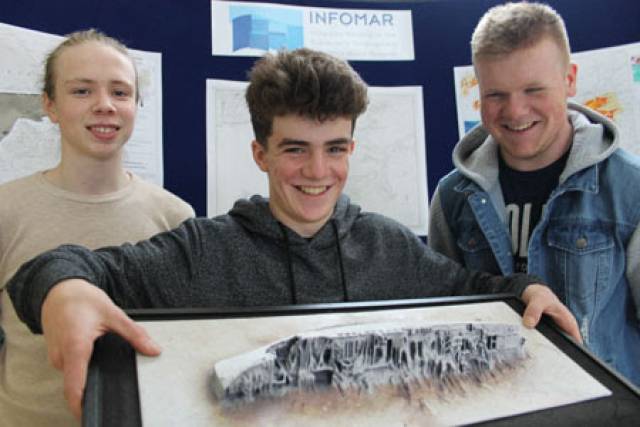#MarineScience - A group of transition year students from five counties around Ireland, including Galway, Clare, Mayo, Roscommon and Meath, recently completed a week of marine science and technology training at the Marine Institute.
Now in its fourth year, the Marine Institute transition year training programme is designed to provide students the opportunity to experience what it is like to work in the marine and technology sector.
"Shadowing scientists and staff, the students took part in interactive experiments involving fisheries and ecosystem science, marine environment and food safety, IT applications development, oceanographic research, advanced mapping and research vessel operations as well as, maritime development and communications. The students also took part in a number of fun team building and communications related activities to develop their interpersonal skills. Completing the week with team presentations highlighting their learning from the programme," explained Catherine Quigley-Johnston, HR manager, Marine Institute.
Ireland's marine sector is a vibrant part of our national economy and the need for education in the marine sector at all levels is highlighted by Ireland's Integrated Marine Plan Harnessing Our Ocean Wealth. A recent publication issued by European Commission also noted that in a well-functioning economy, education and industry are two sides of the same coin, where both need to vigilantly highlight the trends in the future job market.
Dr Peter Heffernan, CEO of the Marine Institute said "it is important for the Institute to promote the opportunities in science, technology and innovation, so as to ensure that students are considering on developing the right skills that they need in the future. This is particularly true for the marine economy, where there are brand-new undertakings for marine technology, biotech to traditional ones in the maritime industry including shipping, sectors which are forever evolving".
Combining classroom and workplace experience is a unique opportunity for the transition year students, bridging the gap between sciences and the blue economy. Training such as the Marine Institute's TY Programme, has many advantages as it improves the student's skills and general knowledge about science and the marine environment, sewing the seeds for future careers.
"After a week with our scientists, we can see the students gaining confidence and the motivation to engage with others, highlighting the importance of protecting and sustainably developing our marine resource as well as talking to others about topical world issues such as dealing with ocean plastic pollution at a local and national level," Ms Quigley-Johnston added.

































































